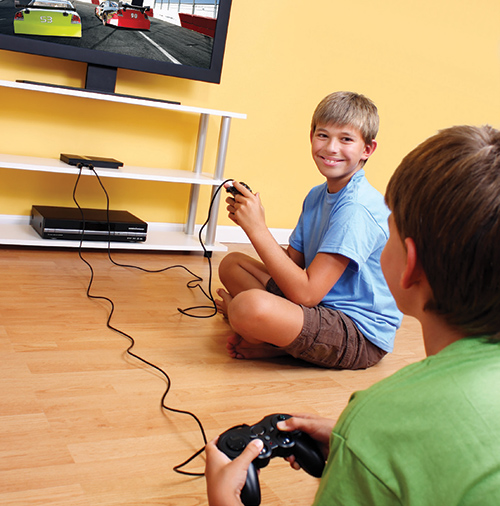Coach Your Child to Play Better
Caroline Maguire, MEd, ACCG, PCC
Attention Magazine October 2019
Download PDF
Effective coaching is a way of being with and communicating with your child.
 THE CORE PRINCIPLES of effective parent coaching for social skills are based on proven strategies and techniques that support positive behavioral change. You don’t have to be some superparent with all the answers. You don’t have to fix your child or fix everybody else to accommodate your child. Set aside every discouraging assumption you’ve ever had about your child and remind yourself: If they could, they would. If they had the executive function skills to connect with others and make friends, then they would. The way your child’s brain is wired makes it harder for her to connect socially with other children. Your coaching and the Play Better playbook is about to change that.
THE CORE PRINCIPLES of effective parent coaching for social skills are based on proven strategies and techniques that support positive behavioral change. You don’t have to be some superparent with all the answers. You don’t have to fix your child or fix everybody else to accommodate your child. Set aside every discouraging assumption you’ve ever had about your child and remind yourself: If they could, they would. If they had the executive function skills to connect with others and make friends, then they would. The way your child’s brain is wired makes it harder for her to connect socially with other children. Your coaching and the Play Better playbook is about to change that.
Effective coaching is more than an attitude or a superficial style. It is a way of being and communicating with your child—a positive predictability and problem-solving approach in the way you listen and respond to your child. Positive predictability means that you reliably respond in ways that encourage, illuminate, engage, and empower your child, cultivating his innate capacity to change and grow. “How would you like things to be different?” “How would you rather be in that situation?” “What would you like friendship to look like?” You want to give your child the roadmap for change by asking where she wants to go, rather than simply telling her to change or even telling her what she needs to do to change. A problem-solving approach means leading your child through the process to help her develop problem-solving skills—not trying to solve the problem for her.
Your child needs direct experience in the step-by-step brain-based processes that develop social awareness, self-awareness, self-regulation, and positive social behaviors. Your coaching, using the following simple techniques and the Play Better lessons, coaching tools, and skill-building activities, creates those learning experiences for your child.
THE COACH APPROACH
Reflective listening, open inquiry, and praise and prompting
Three basic communication techniques are the foundation for all of the Play Better coaching principles, practices, and activities ahead. The parent/child relationship is a powerful channel for communication, and these techniques build on that natural connection. For that reason, they are simpler than you might think. They enhance your communication with your child any time, so go ahead and start using them. The more your child becomes accustomed to this quality of conversation with you in everyday ways, the more you are prepping and paving the way for the coaching conversations and lessons ahead.
Reflective listening
In reflective listening, you first listen to what your child tells you, then restate or summarize—reflect back to your child—what you’ve heard, showing that you understand what’s been said. If you haven’t understood, then your child can say so and clarify so that you’re both on the same page as you continue your conversation. Reflective listening helps you understand and empathize with your child. It helps her feel understood and validated. That’s especially important for children who struggle socially: they typically spend a lot of time feeling misunderstood and misjudged, never getting a chance to explain themselves.
Because you paraphrase his comments and reflect his ideas back to him, you also allow your child to hear himself more objectively, which can lead to insights that he might miss in the rush of an ordinary conversation. For example, he might declare that he believes that “people should invite me to play—I shouldn’t have to approach them.” When you “reflect” this statement back to him—“What I hear you saying is that you won’t approach anyone; they must come to you”—you accomplish two things. First, you invite him to clarify or correct what he intended to communicate when he said that. Also, by inviting him to review your interpretation of his statement, he hears it fresh himself, through you and not solely in the echo chamber of his own mind. The simple act of hearing his ideas expressed back to him, then thinking about how he was heard and how that compares with what he intended to communicate, are all executive function tasks that your response has now prompted him to do. Over time, your practice of reflective listening will enable him to develop his thought processes and insight about his social behavior.
Open-ended questions
The second basic coaching communication technique is to ask nonjudgmental open-ended questions—questions that begin with how, what, when, and where. These questions invite conversation instead of yes/no responses, which are conversation dead ends. Open-ended questions tap into a child’s curiosity and her eagerness to offer information that you value. “How did the other kids act when Martin did that?” “What do you think made Kate get angry?” What you’re really asking is for your child to think about what she observed in a social setting. You’re asking her to bring the memory for- ward, think about it in retrospect, and glean social and emotional clues now that she wasn’t necessarily tuned in to at the time. When children are asked these types of questions, they learn to self-evaluate, comparing their own ideas about their behavior and the social world against their parents’ ideas and expectations. The combination of open questions and reflective listening promotes a wide range of executive function skills required for social problem-solving.
The question you want to answer in your own mind is this: How come? How come the other children don’t want to play with my child? How come my child is melting down or blowing up in this situation? Look at the difference between the question, Lucy, why did you do that? which puts the child on the spot to explain herself, and the more effective How come? questions designed to help you both better understand: What happened? What do you believe about why it happened? How do you feel when someone behaves that way toward you? That’s how you get the accurate information you need to understand why this is happening to your child, and focus your coaching more effectively.
If your child says, “I don’t know” or “I don’t remember,” you can ask these questions:
- What do you think your (teacher, friend, or other) would say?
- Can you tell me what you know about this?
- What is one thing, no matter how small, that you can remember?
- If you had a golden ticket like Charlie in the Chocolate Factory, and you could say anything on this topic, what would you say?
When a child feels put on the spot with questions, they sometimes freeze up. Give them time and circle back. Use humor. Let’s make a deal: Tell me four words you do not want me to say today. If I promise not to say those four words, then you promise not to say “I don’t know.” Give them crazy options and get them laughing and they’ll protest: “No, it’s not that—it’s this!”

Coaching In Action: Listen In
Parent: Hey, buddy, I notice your friend left. What’s going on?
Ned: He left because no one likes me and he was just boring anyway.
Parent: Hmm, what if you walked me through the playdate? What did you two do?
Ned: I played a video game.
Parent: Interesting. What about your friend?
Ned: He watched.
Parent: I am wondering what your friend felt when he did not play and he just watched?
Ned: Oh, he likes it.
Parent: Hmm, but what if you just watched and didn’t get to play? What would that feel like?
Ned: I would be fine.
Parent: Hmm, I am wondering, what is your job as a host and a friend? What does it look like to play with someone?
Ned: Oh, I guess I kind of just played and didn’t think about him.
Ned just acknowledged that he doesn’t think about his friend’s feelings. Ordinarily, that would be a disappointing thing to hear. But Ned wasn’t divulging anything his mother didn’t know already. What was new, and represented important progress, is that he had come to this realization about his behavior himself. It was his insight, not his mother’s corrective mantra.
Praise and prompting
Praise and prompting are how you acknowledge your child’s effort and progress. For a child who is struggling, praise is a clear and encouraging message that he is making progress. Celebrate every win, stop looking for complete transformations all at once, and instead say, “Wow, I saw you try, and that is progress.” Maybe your child stopped himself from responding impatiently or angrily to someone. Maybe he offered to share a toy. Your praise is for taking that positive step forward. A child who is oblivious to his role in a social setting first has to develop the awareness that he has a role before he can make the connection between awareness, intention, and action. Rather than constantly look for your child to get everything right, acknowledge and cheer signs of change and effort. Awareness, intention, or any demonstrable action is significant progress.
Prompts are signals or cues to remind children of a positive behavior they want to practice. In coach mode, you’ll use prompts or cues discreetly to draw their attention to their behavior. You might have agreed that a certain cue means, “What do you think your friend wants to play?” Like a high five or thumbs-up, this shorthand messaging can help children make a quick mental connection between their action and the intention they’ve been focused on in their coaching lesson. It is also a way to prompt them to pause and pay attention to their emotions, body, and environment.
From Why Will No One Play with Me?: The Play Better Plan to Help Children of All Ages Make Friends and Thrive by Caroline Maguire, PCC, MEd. Copyright © 2019 by the author and reprinted with permission from Grand Central Publishing. All rights reserved.
Caroline Maguire, ACCG, PCC, MEd, is a personal coach who works with children with ADHD and the families who support them. She earned her ACCG from the ADD Coach Academy and her PCC from the International Coach Federation. She received her master’s degree in education from Lesley University. Her revolutionary coaching program and methodology helps teach executive function skills to children, teenagers, and young adults. Maguire maintains a speaking schedule of over nearly 300 events and seminars a year.
Other Articles in this Edition
My First ADHD Conference Changed My Life
Connection and Community: ADHD reWired Coaching and Accountability Groups
More Than Refills: The Importance of Regular Follow-Up Visits
Treating ADHD and Emotion Dysregulation
Coach Your Child to Play Better
Organize Assignments with Customizable Apps
Is There a “Right Fit” College for My Student with ADHD?
Where Can Adults with ADHD Find the Best Treatment?
